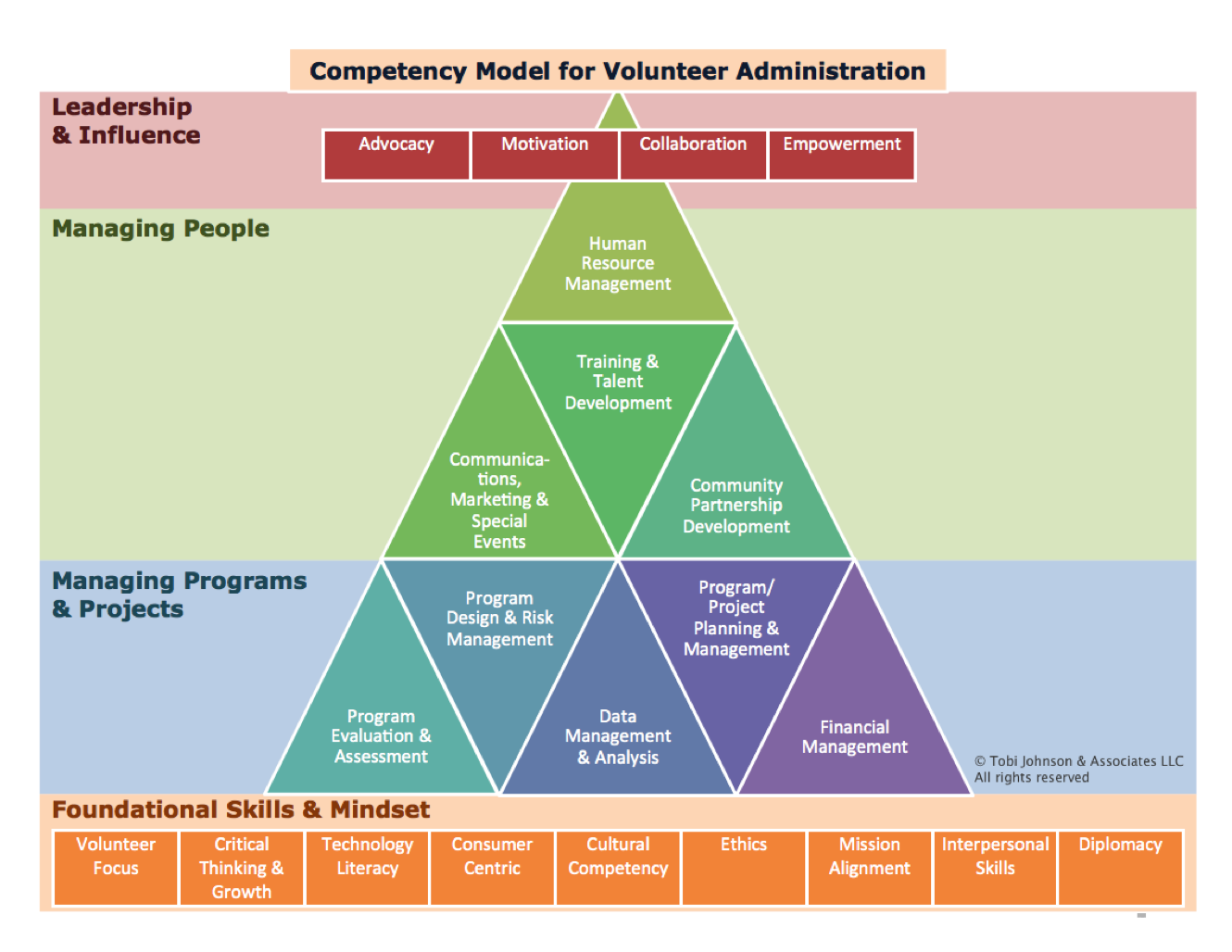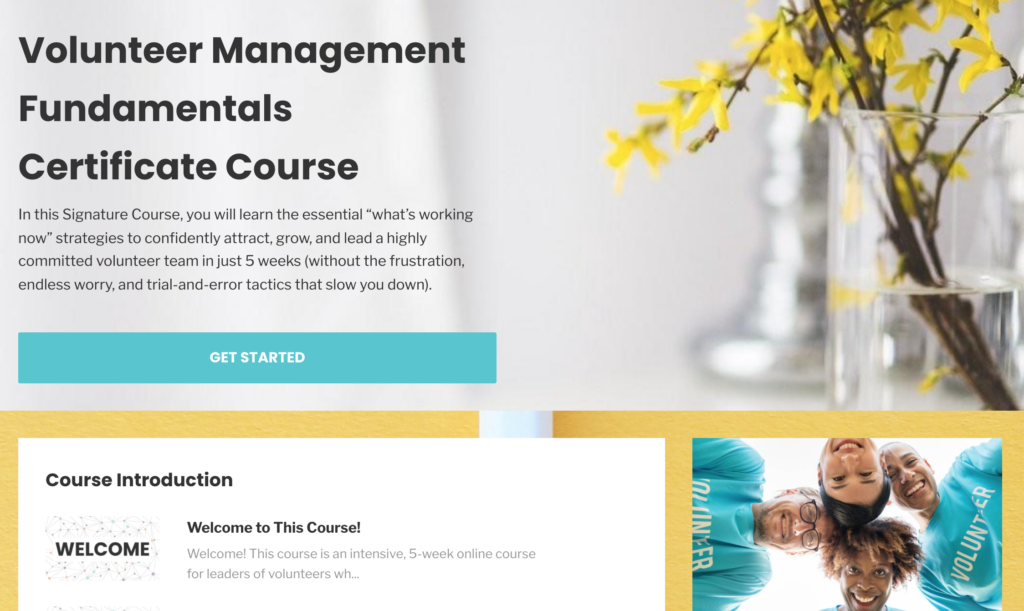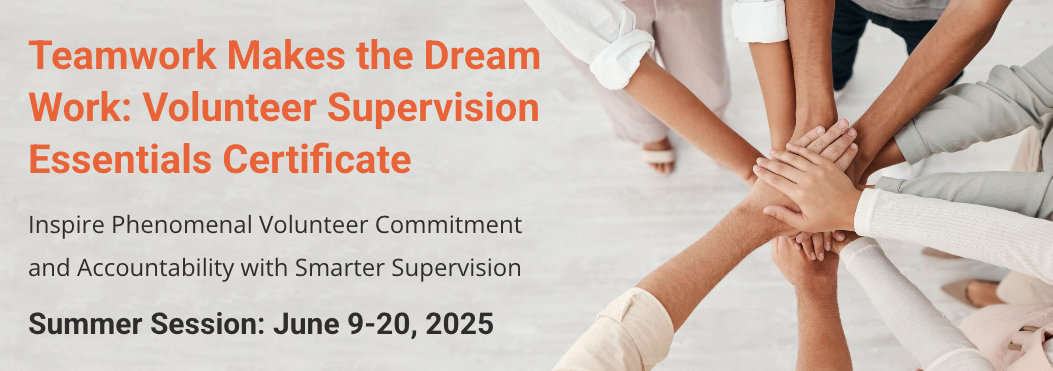The Complete Guide to Volunteer Management Competencies for Today’s Leaders
At the end of the year, it’s a natural time to assess your own nonprofit leadership skills and whether they meet today’s core volunteer management competencies.
Are you equipped and ready to meet the challenges of the year ahead?
Where are your strengths? What are skill areas where you may need to grow your capabilities?
More importantly what’s your plan to fill in the gaps?
Volunteer Management Competencies Defined
A competency is the capability to apply a set of related knowledge, skills, abilities and personal attitudes to successfully perform functions or tasks in a defined work setting.
Competencies are important for defining a profession and are helpful in determining a baseline set of actions needed for success. As a field evolves, its competencies must be reviewed and updated to align with current business and environmental realities.
A competency model, on the other hand, is a collection of competencies that define successful performance in a particular field of work. Moreover, it offers a comprehensive way to identify and address skill gaps that may hinder career advancement or success on the job.
Competency models support successful recruitment and hiring, training and development and performance management of staff by providing a focused and defined skill set.
Competency models can be developed on a micro or macro level — for specific jobs, job clusters, organizations, occupations or industries.
In some cases, the person responsible for volunteer administration is also responsible for other program areas, and their job title does not include the word “volunteer.” Regardless of the position title, if the job includes the coordination of volunteers, the volunteer management competencies apply.
Volunteer Management Competencies: A Model for Today
Mobilizing volunteers is a complex enterprise. to do it successfully, it requires a number of skills in key areas. We would argue that there are very few nonprofit jobs that include such a vast variety of interpersonal skills, strategic thinking, and organizational know-how.
It really IS rocket science!
And, the immense scope of work is often under-appreciated and under-resourced.
To help build a better understanding of the concrete set of skills that fuel success on the job, we are sharing our list.
Below is the volunteer management competency model that we developed through years of boots-on-ground experience building and managing successful volunteer efforts and training thousands of professionals around the world.
It’s a great framework for self-reflection and can help employees pinpoint key areas for growth that could propel their results forward, by making an impact as a nonprofit leader.
This has also been a guide for the content we develop our VolunteerPro Premium Membership Community. With this framework, we want volunteer leaders to work on their professional develop plan with a clear purpose and a thoughtful strategy.
This model can also assist nonprofit leaders and supervisors in develop their own frameworks for supporting the professional development of their employees and develop clear job descriptions for volunteer coordinators.
It can also help volunteer managers asses their areas of highest need and agree on a plan for development with their supervisors.
How Volunteer Management Competencies Can Help
We hope this model will be useful to those who work in a broad range of roles within the aging services network including:
- Executive-level leaders who are allocating resources for volunteer programs
- Organizations that are reviewing their volunteer strategy or seeking to change their staffing model to better support volunteer programming
- Funders who are hoping to better understand the human resources needed to coordinate a successful volunteer efforts
- Networks that are looking to make targeted investments in training and professional development for leaders of volunteers
- Human resources departments who are hiring volunteer managers
- Agency employees who are responsible for supervising volunteer managers
- Agency employees who are responsible for leading volunteers, either full time or as part of a number of roles within the organization
- Volunteers who are responsible for leading fellow volunteers
Volunteer Management Competency Model in 9 Domains

The following are the key competency domains, definitions and major tasks within the Competency Model for Volunteer Administration.
This list can be used to develop position descriptions, identify strengths and areas for growth, pinpoint strategic training and development needs and help chart individual professional development plans for volunteer coordinators and leaders of volunteers.
Below are some key domains and basic and advanced skills under each.
Human Resource Management
The ability to engage and support volunteers in a systematic and intentional manner to meet the organization’s strategic objectives.
Basic
-
- Process volunteer applications
- Screen for suitability
- Assess skills and qualifications
- Match with appropriate role
Advanced
-
- Direct and supervise work
- Provide feedback
- Conduct progressive discipline procedures, as needed
- Perform exit interviews
Communications, Marketing & Special Events
The ability to create, communicate, deliver and exchange information that has value to a variety of internal and external stakeholders.
Basic
-
- Identify the information needs of key audiences
- Develop volunteer recruitment plans
- Develop consumer outreach plans
- Create and update program-specific talking points
- Make community presentations
Advanced
-
- Design communications materials for a variety of media
- Facilitate consumer and volunteer feedback loops
- Coordinate special events and other community outreach tactics
Training & Talent Development
The ability to build an organization’s capacity through the development of volunteer skills and performance.
Basic
-
- Facilitate in-person and virtual training events
- Coach volunteers for success
- Acknowledge and recognize the work of individuals and teams
Advanced
-
- Establish and update learning objectives
- Design formal and informal learning activities
- Provide opportunities for individual personal and professional growth
- Align talent with organizational objectives
Community Partnership Development
The ability to develop mutually beneficial collaborations with organizations with common interests and goals.
Basic
-
- Identify prospective partners from diverse personal and institutional backgrounds
- Cultivate stakeholder and partner relationships
- Communicate goals and details of partnership to affected parties
- Troubleshoot conflicts or issues with partnerships as they arise
Advanced
-
- Enlist the participation of stakeholders in supporting the organization’s strategic objectives
- Negotiate formal and informal agreements
- Provide support to the partner’s strategic objectives in kind
Program/Project Planning & Management
The ability to define strategy and plan, organize, motivate and control resources in order to achieve specific, time-limited goals.
Basic
-
- Assess organizational volunteer needs and opportunities
- Establish project time frame, scope of work and budget
- Monitor project progress and make mid-course corrections as needed
Advanced
-
- Perform program and community needs assessments
- Provide support to the partner’s strategic objectives in kind
Program Design & Risk Management
The ability to develop programs, initiatives and processes that reduce harm and align with the organization’s mission and vision.
Basic
-
- Design volunteer roles and position descriptions
- Create and update program policies and procedures
- Prevent and mitigate risk
- Create, model and uphold code of ethics and professional principles
- Comply with applicable legal and regulatory requirements
Advanced
-
- Develop team charters and operating plans
- Conduct a program risk assessment
- Write a risk management plan
Data Management & Analysis
The ability to collect, analyze and act upon reliable and valid data in order to engage in program monitoring and reporting to stakeholders.
Basic
-
- Systematically collect both quantitative and qualitative data
- Track program outcomes
- Ensure data collection and integrity
- Run reports for data analysis
- Identify significant trends and patterns
- Create reports for internal and external stakeholders
- Ensure accurate and secure record keeping
Advanced
-
- Design or select survey questionnaires that generate high quality data
- Conduct statistically valid analysis
- Recommend and initiate performance improvement activities
Program Evaluation & Assessment
The ability to use data to conduct a systematic assessment of the processes and outcomes in order to improve the program’s results.
Basic
-
- Evaluate project outcomes
- Lead quality assurance and customer satisfaction initiatives
- Review effectiveness of volunteer recruitment and communications tactics
- Assess the productivity and results of strategic partnerships
- Adjust strategies and tactics, as needed
Advanced
-
- Evaluate impact of learning and talent management strategies
- Appraise the current status of organizational risk
- Collect and disseminate best practices and key learning internally and externally
Financial Management
The ability to generate, manage and control cash and in-kind resources and be responsible stewards of public and private funds.
Basic
-
- Develop (or provide information for) program budget, as appropriate
- Monitor expenditures
- Write grant status reports, as appropriate
- Ensure appropriate processing of volunteer reimbursements
Advanced
-
- Develop grant proposals and applications for funding, as appropriate
- Ensure grant compliance
- Fundraising
- Generate in-kind resources to support program and volunteers
Volunteer managers have always been some of the greatest leaders and change makers across the globe. It’s exciting to think about what we can all achieve if we make a plan to grow individually.
Strengthen Your Nonprofit’s Volunteer Management Competencies in 2022
Are you ready to build, grow, and scale your volunteer efforts in 2022? If so, then our signature online course is the perfect fit for you.
We will be opening enrollment in early 2022. So, now is the time to join our waitlist so that you get our early alerts when the doors are about to open. 
Opening in Early 2022: Volunteer Management Fundamentals Certificate
Join us for the most comprehensive program in the field for leading a high-impact volunteer engagement strategy that works.
This online course is the only implementation program of its kind that not only shows you exactly how to attract qualified volunteers – but how to make your org the place they want to return to again and again.
Over 8 weeks of instruction, you will learn everything you need to implement or make improvements to your volunteer programming. As a student, you’ll also be invited to our live Q&A coaching calls and have lifetime access to the course.






